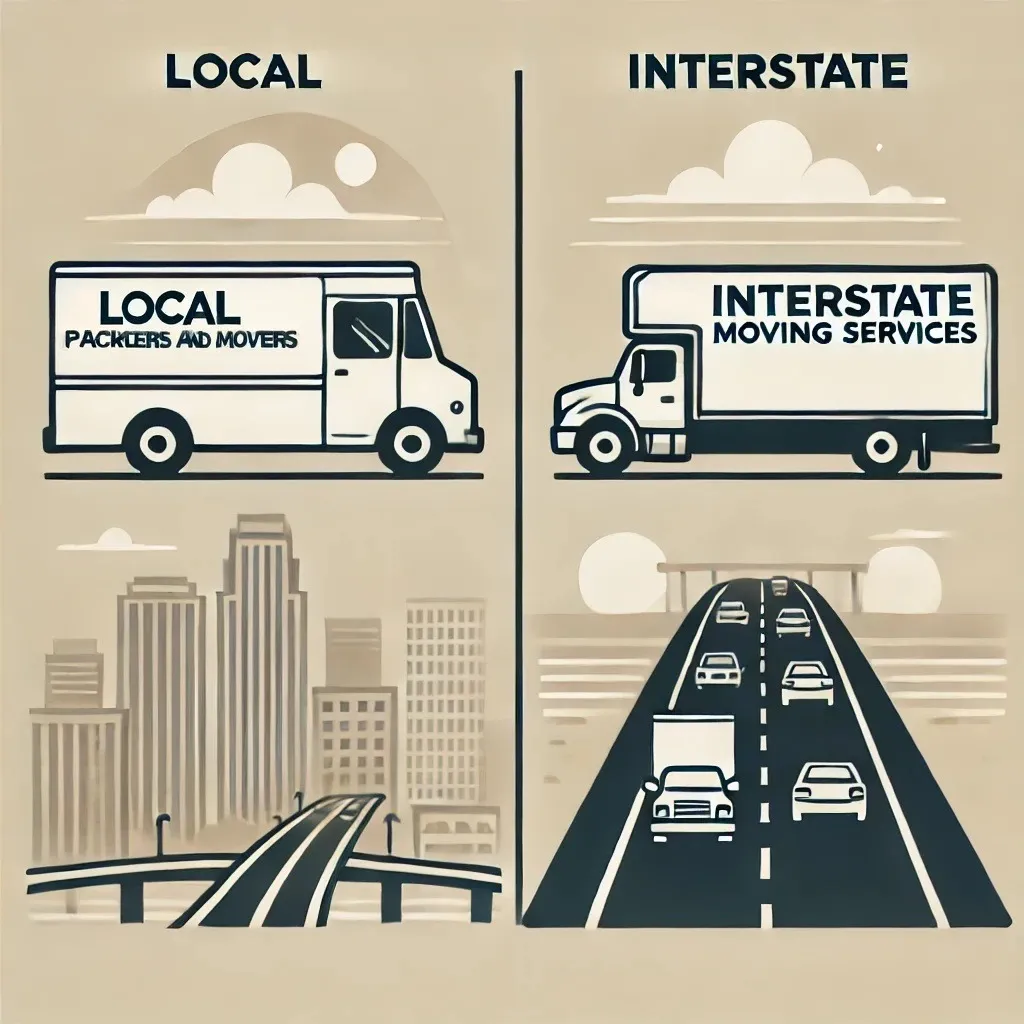When it comes to moving, understanding the differences between local and interstate packers and movers is essential for a smooth transition. Each type of move comes with its own set of challenges, costs, and logistics. This guide will compare the services, fees, and logistics involved in local versus interstate moving, helping you make an informed decision for your home relocation.
Understanding Local and Interstate Moves
Local Moves:- A local move typically refers to relocating within the same city or a nearby area. These moves generally cover shorter distances, often within a 50-mile radius. Local moves are characterized by the following:
Shorter Distances:- Local moves usually involve less travel time and distance, making them less complex than interstate moves.
Less Regulation:- Local moving companies are subject to fewer regulations compared to interstate movers, which simplifies the process.
Quick Turnaround:- Since local moves are shorter, the entire process, from packing to unloading, can often be completed in a single day.
Interstate Moves
Interstate move:- An interstate move involves relocating from one state to another, crossing state lines. These moves are subject to more regulations and can be more complex due to.
Longer Distances:- SInterstate moves can cover hundreds or even thousands of miles, increasing travel time and costs.
Regulatory Compliance:- Interstate movers must comply with federal regulations set by the Federal Motor Carrier Safety Administration (FMCSA), including obtaining a USDOT number.
Logistical Challenges:- Interstate moves may require more planning, including navigating tolls, varying state regulations, and potential delays.
Comparing Services
Local Packers and Movers Services Offered:-
1. Packing and unpacking
2. Loading and unloading
3. Transportation within the city
4. Short-term storage options
Tips to Reduce Moving Costs
Cost Structure:- Local packers and movers charge a flat rate or hourly rate, depending on the volume of items and the time taken.
Flexibility:- Local movers often offer more flexible scheduling, allowing you to choose a moving date that suits you best.
Interstate Packers and Movers
Services Offered:-
1. Comprehensive packing and unpacking
2. Long-distance transportation
3. Insurance coverage for your belongings
4. Storage facilities, if needed
Cost Structure:- Interstate moves usually charge based on the distance traveled and the weight of your belongings. Expenses can fluctuate significantly based on these elements.
Regulatory Compliance:- Interstate movers are required to provide a written estimate and adhere to regulations regarding insurance and safety.
Cost Comparison
Local Moving Costs:- Average Costs: The cost of local moves generally ranges from ₹3,000 to ₹20,000, depending on factors such as the size of your home and the volume of items being moved.
Factors Influencing Costs:
Distance:- Shorter distances lead to lower costs.
Volume of Goods:- More items mean higher costs due to increased labour and packing materials.
Time of Move:- Weekends and peak seasons may incur higher rates.
Interstate Moving Costs
Average Costs:- Interstate moves can be significantly more expensive, ranging from ₹10,000 to ₹50,000 or more, depending on distance and the weight of your belongings.
Factors Influencing Costs:
Distance:- Longer distances result in higher fuel and labour costs.
Weight of Goods:- The total weight of your items directly affects transportation costs.
Insurance:- Interstate movers often require insurance, adding to the overall expense.
Logistics of Moving
Local Moving Logistics:-
Packing:- Local movers can often complete packing and loading in one day, making the process quick and efficient.
Transportation:- Since the distance is shorter, transportation logistics are simpler, with fewer stops and less time on the road.
Unloading:- Unloading is typically done on the same day, allowing for a quick transition into your new home.
Interstate Moving Logistics:-
Packing:- Interstate movers may take more time to pack your belongings securely, often using more packing materials to ensure safety during transit.
Transportation:- The logistics of an interstate move are more complex, requiring careful planning for fuel stops, rest breaks, and potential overnight stays.
Unloading:- Unloading may take place over several days, depending on the distance and the schedule of the moving company.
Conclusion
Choosing between interstate and local packers and movers depends on your specific moving needs. Local moves are generally more straightforward, with lower costs and fewer regulations, making them ideal for short distances. On the other hand, interstate moves require more planning, regulatory compliance, and a higher budget due to the complexities involved.
By understanding the differences in services, costs, and logistics, you can make an informed decision and ensure a smooth moving experience. Whether you are relocating locally or across state lines, choosing the right packers and movers is crucial for a successful transition.







